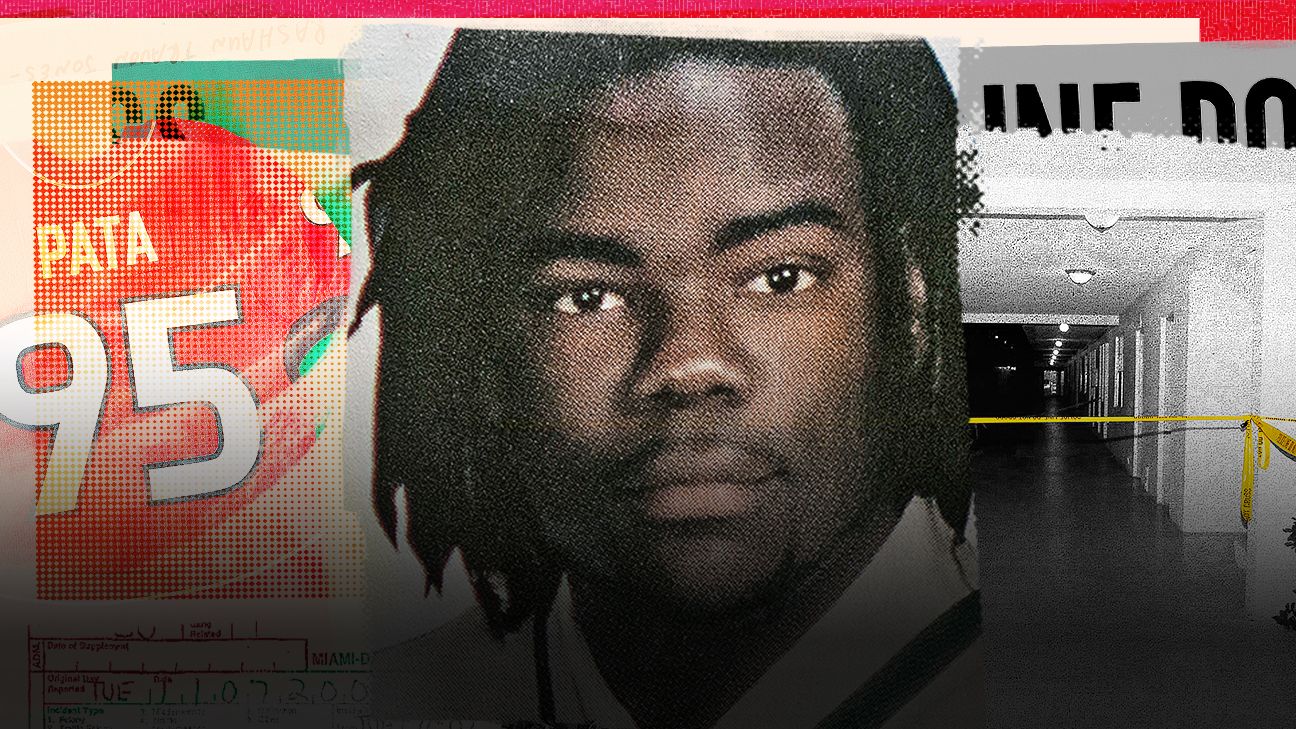The attorney for the ex-Miami Hurricanes football player accused of murdering teammate Bryan Pata in 2006 said Friday that the case against Rashaun Jones is based on circumstantial evidence that police “sat on” for 15 years.
Defense attorney Michael Mirer represented Jones at a bond hearing in Dade County, Florida, on Friday in which a judge denied his request, meaning the 35-year-old is expected to remain in jail on a first-degree murder charge until his arraignment hearing on Sept. 17. Mirer said Jones will plead not guilty. If convicted, Jones could receive a sentence of death or life without the possibility of parole.
“It’s an unusual case,” Mirer told ESPN. “I mean, the arrest warrant talks about evidence that police gathered back in 2007, sat on for 15 years, and re-interviewing the same eyewitness that they allegedly interviewed back in 2007 without any further evidence in the arrest warrant.”
Mirer said he didn’t want to speculate on why police made the arrest last week. “[Jones] maintains his innocence and is looking forward to his day in court,” he said.
Jones was arrested in Ocala, Florida, on Aug. 19, and was taken to Miami’s Turner Guilford Knight Correctional Center on Thursday. The arrest warrant outlines the evidence against Jones, including interviews with people who said Jones was making threats, cell phone signal records that indicate he wasn’t at his residence that night as he had told police, and ballistics reports indicating the bullet found in Pata matched the caliber of a type of gun Jones had.
The warrant also referenced a witness, who in 2006 gave police a description of a man leaving the scene of the shooting that resembled Jones. The man picked Jones out of a photo lineup in 2007, and again in September 2020 when police conducted a follow-up interview.
The evidence in the warrant mostly appears to be from records and statements police had within a couple years of the shooting, and spokesmen for the police and state attorney have declined to answer questions about what new evidence they might have or what prompted the arrest. A spokesman for the Miami-Dade State Attorney declined to comment Friday on the statements made by Mirer. The Miami-Dade Police Department did not immediately respond to a request for comment.
The arrest warrant states that it is being submitted “for a limited purpose of establishing probable cause” and does not include every “aspect, fact or detail” of this investigation. In Florida, prosecutors have 15 days after the filing of formal charges to turn over evidence to the defense if the defendant elects to participate in exchanging discovery materials.
On November 7, 2006, Pata was arriving home from practice when he was shot in the head as he got out of his SUV in front of his apartment complex four miles from campus. An ESPN investigation last fall revealed police had long considered Jones a suspect. According to police documents and interviews, Jones and Pata had a history of arguments and fights, and Jones previously dated Pata’s girlfriend, Jada Brody. Police interviewed and/or ran background checks on at least 100 people in a case file that exceeded more than 4,000 pages, but only one person had the word “suspect” written on their cover page: Jones.
In previous interviews with ESPN, police theorized that the shooter had been waiting for Pata, possibly in the bushes or behind a dumpster. No security cameras in the area captured the shooting.
In March 2020, ESPN sued the Miami-Dade Police Department for withholding and redacting records in the case, which the network argued should be public because the case was no longer active. But police disagreed it was dormant and promised a renewed effort.
Lt. Joseph Zanconato, who was later transferred out of the homicide unit, told the judge that police were just “a puzzle piece” away from closing the case. Asked whether the department would make an arrest “in the foreseeable future,” Zanconato answered: “Yes.”
Pata, the youngest of nine children, was months away from being selected in the NFL draft. He’d hoped to provide for his mother, a Haitian immigrant. When asked last week about the contents of the arrest warrant, and whether it contained any new evidence, Pata’s brother Edwin seemed optimistic. “There has to be something new,” Edwin Pata said. “From the sound of it, and I’m not trying to jeopardize their case, but there is something new that probably broke that they were hoping for, that time would help with that. And it finally did.
“There’s more to it. For sure there’s more to it.”


